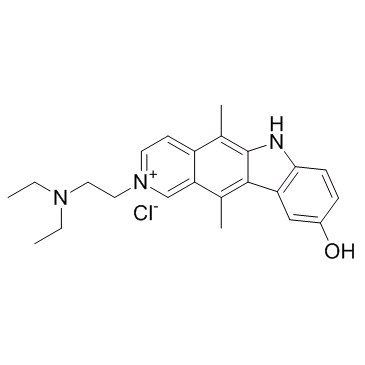105118-14-7
| Name | 2-[2-(diethylamino)ethyl]-5,11-dimethyl-6H-pyrido[4,3-b]carbazol-2-ium-9-ol,chloride |
|---|---|
| Synonyms |
2-(2-(Diethylamino)ethyl)-9-hydroxy-5,11-dimethyl-6H-pyrido(4,3-b)carbazolium chloride
Cloruro de dateliptio Datelliptium Chloride Chlorure de datelliptium Datelliptii chloridum |
| Description | Datelliptium chloride is a DNA-intercalating agent derived from ellipticine, with anti-tumor activities. |
|---|---|
| Related Catalog | |
| In Vitro | Datelliptium (100 μM) shows significantly cytotoxic effects after 2 hr of treatment in suspension and primary cultures of rat hepatocytes. Datelliptium mobilizes glycogen in both rat systems in vitro concentration dependently. The half-maximal effect is 14.3 μM in isolated hepatocytes, whereas in cultured rat hepatocytes it is 5.9 μM. Datelliptium also leads to a concentration-dependent decrease in gluconeogenesis from lactate in cells[1]. Datelliptium acetate is selectively cytotoxic for solid tumors over leukemia L1210. Human tumors H-125 and HCT-116 demonstrates less sensitivity to datelliptium acetate[2]. |
| In Vivo | Upon intravenous administration, datelliptium acetate shows potent inhibitory activities in vivo against a variety of murine solid tumors. Datelliptium acetate is highly active against early-stage colon #38 with highest non-toxic dose (HNTD) of 170 mg/kg TD, and weight loss of 10%, T/C of 0%[2]. |
| Cell Assay | Cytotoxicity is estimated after short-term exposure (2 hr) to datelliptium using suspended and cultured rat hepatocytes. When cytotoxicity is evaluated after longer-term exposure, using human and rat monolayers and hepatoma cell lines, the compound is added 1 hr after cell plating and incubated for 23 hr. The loss of intracellular LDH and the MTT test are the endpoints evaluated in cultured cells. The intracellular LDH is measured in the microwell culture plates by a colorimetric method. The MTT test, reduction of the tetrazolium salt MTT to formazan by mitochondrial succinate dehydrogenase, is performed as described. Cytotoxicity in the hepatocyte suspension is evaluated by LDH leakage to the medium after a 2-hr treatment with the drug. |
| References |
| Molecular Formula | C23H28ClN3O |
|---|---|
| Molecular Weight | 397.94100 |
| Exact Mass | 397.19200 |
| PSA | 41.29000 |
| LogP | 5.80890 |
| Storage condition | 2-8℃ |
